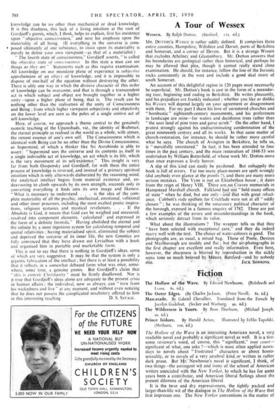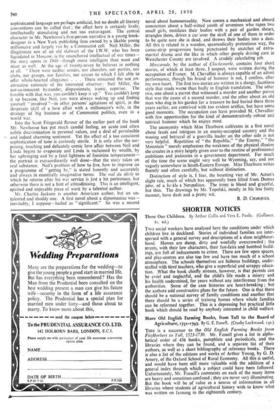Fiction
The Hollow of -the 'Wave. By Edward Newhouse. (Reinhardt and Evans. 8s. 6d.) The Hollow of the Wave is an interesting American novel, a very readable novel and probably a significant novel as well. It is a tire- some reviewer's word, of course, this " significant," tout court— significant of what, one asks ?—which is most often applied nowa- days to novels about " frustrated " characters or about homo- sexuality, or to novels of a very cerebral kind,,or written in rather dark prose. But Me.'Newhouse's novel is significant, I think, of two things—the astringent wit and irony of the school of American writers associated with the New Yorker, to which he has for sonte years been a contributor, and American liberal feelings about the present dilemma of the American liberal.
It is the terse and dry expressiveness, the tightly packed and larger-than-life wit of the dialogue in The Hollow of the Wave that first impresses one. The New Yorker conventions in •the matter of sophisticated language are perhaps artificial, but no doubt all literary conventions can be called that ; the effect here is certainly lively, intellectually stimulating and not too extravagant. The central character in Mr. Newhouse's first-person narrative is a young book- designer in a New York publishing firm owned by a likable young millionaire and largely run by a Communist cell. Neil Miller, the illegitimate son of an old stalwart of the I.W.W. who has been liquidated in Moscow, is the unanchored intellectual of our times— the story opens in 1940—though more intelligent than most and nicer as well. At the age of twenty-seven he believes in nothing at all. " There were neither armies, nor churches, nor parties, nor clubs, nor groups, nor families, nor causes to which I felt able to offer whole-hearted allegiance. . . . There remained the noi_un- attractive rationale of the interested observer: • Neil Miller, the not-so-innocent bystander, dispassionate, ironic, superior. The trouble with that was, you couldn't keep it up." You couldn't keep it up because, like Neil, you were always waking up and finding yourself " involved "—in other persons' agitations of spirit, in the desperate idyll of a love affair with a millionaire's wife, in the strategy of big business or of Communist politics, even in a world war.
Into the Scott Fitzgerald flavour of the earlier part of the book Mr. Newhouse has put much candid feeling, an acute and often subtle discrimination in personal values, and a deal of permissible - and indeed charming sentiment. Yet the effect of a too consistent sophistication of tone is curiously sterile. It is only after the sur- prising, touching and delicately comic love affair between Neil and Linda begins to evaporate and Linda is reclaimed by wealth, by her upbringing and by a fatal lightness of feminine temperament— the portrait is extraordinarily well done—that the story takes on real substance. Neil's problem of how to live, how to improve on a programme of " getting by," is stated honestly and accurately and always in essentially imaginative terms. The mal du siecle to which he returns after his war service is just a bit portentous, but otherwise there is not a hint of attitudinising. This is an intelligent, spirited and enjoyable piece of work by a talented author.
Mr. Charles Jackson is another American author, but an un- talented and shoddy one. A first novel about a dipsomaniac was— inevitably, I suppose—hailed as " significant." So was a second novel about homosexuality. Now comes a mechanical and absurd concoction about a half-witted youth of seventeen who rapes two small girls, mutilates their bodies with a pair of garden shears, strangles them, drives a car over the skull of one of them in order to be quite sure she is dead, and throws their bodies into a dam. All this is related in a wooden, spasmodically pretentious way, the comic-strip progression being punctuated by snatches of extra- marital drama and the like in which other people driving cars in Westchester County are involved. A crudely calculating job.
Mascarade, by the author of Clochemerle, contains four short stories, of which at least three, I suspect, were written during the occupation of France. M. Chevallier is always capable of an adroit performance, though his brand of humour is not, I confess, after my own heart. The first two stories are written in a slangy, facetious style that reads worse than badly in English translation. The other two, one about a parrot that witnessed a murder and another parrot that was the cause of a second murder, and the other about an old man who dug in his garden for a treasure he had buried there three years earlier, are contrived with too evident artifice, but-have some good moments. The occupation can have provided M. Chevallier with few opportunities for the kind of demonstratively robust and satirical humour which he enjoys most.
The anonymity which Miss Thurburn cultivates in a first novel about feuds and intrigues 'in an enemy-occupied country and the wooing and betrayal of a guerrilla leader on the other side is not very helpful. Repetition of " the Republic," " the Enemy," " the Mountain " merely emphasises the weakness of the physical illusion she creates in a story largely given over to the routine of professional ambitions and jealousies in a government department. For much of the time the scene might very well be Wyoming, say, and not vaguely somewhere in South-Eastern Europe. Miss Thurburn writes fluently and often carefully, but without distinction.
Distinction of style is, I fear, the besetting vice of Mr. Acton's slight tale, much of which has apparently been lifted from Dumas pere, of a lu:kle s Neapolitan. The irony is bland and graceful, but thin. The drawings by Mr. Topolski, mostly in his less fuzzy manner, have dash and a pretty wit.
R. D. CHARQUES.











































 Previous page
Previous page